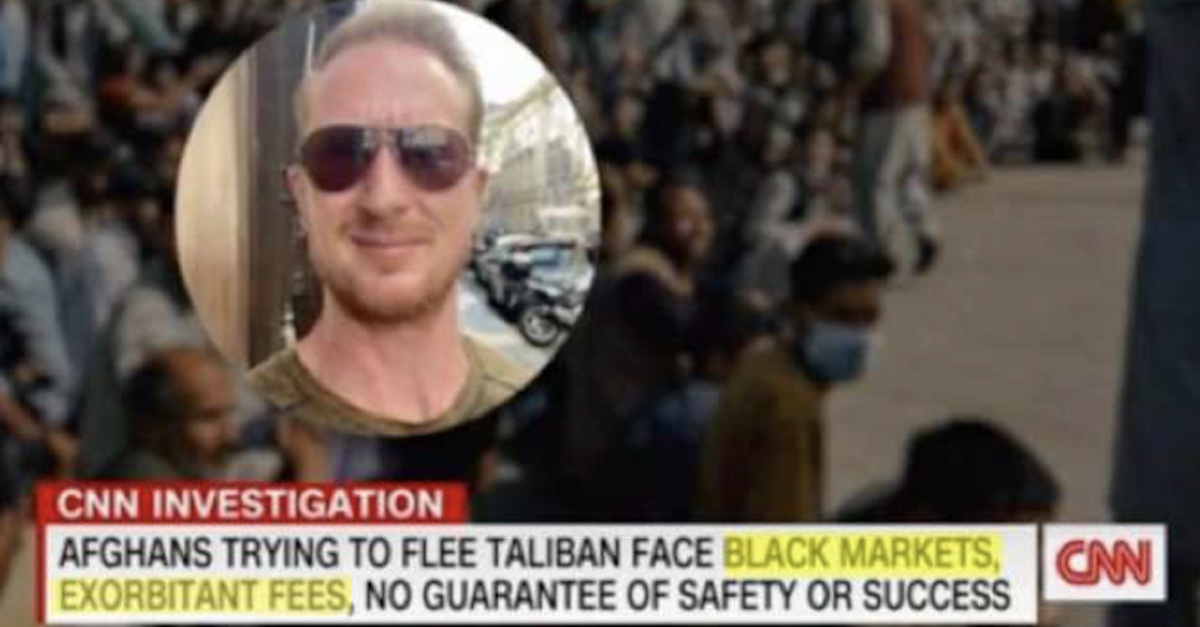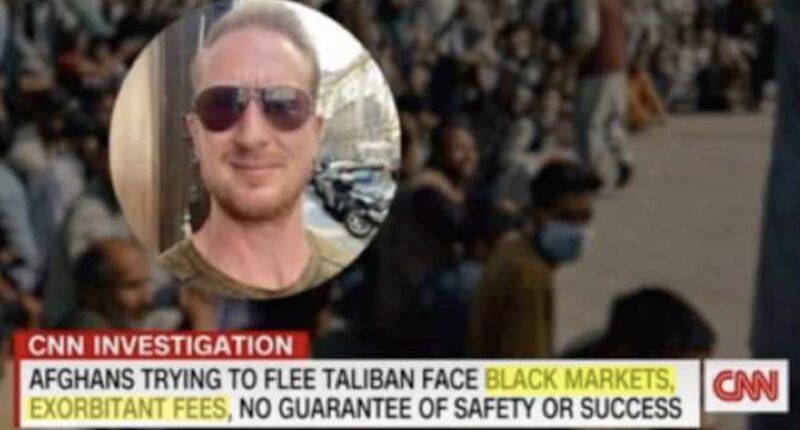
A court exhibit highlights a CNN chyron from a segment aired on Nov. 11, 2021, along with a picture of Zachary Young (via court documents).
A U.S. Navy veteran’s potentially costly defamation lawsuit against CNN can move forward, a judge in Florida has ruled.
On the night of December 6, while addressing several motions for summary judgment and motions in limine, the court decided that Zachary Young can proceed with his accusations and present his case against the first 24-hour cable news network on television before a civil jury in Florida.
Another significant win for Young was the court’s ruling that punitive damages could be considered, posing a notable legal setback for the network. This means that if Young establishes the foundational claims in his lawsuit, CNN might face potential financial liabilities amounting to millions of dollars.
The underlying lawsuit was filed in Bay County, Florida, where 14th Judicial Circuit Court Judge William Henry is overseeing the case.
Young, an American citizen residing in Austria and serving as the president of Nemex Enterprises, a Florida-based corporation, filed a lawsuit against CNN citing defamation per se, defamation by implication, group libel, and trade libel. He alleges that CNN distorted his actions as a security consultant in Afghanistan aimed at saving lives by spreading inaccurate information for the sake of sensationalism.
The segment at issue, which aired on Nov. 11, 2021, and featured correspondent Alex Marquardt’s reporting on Jake Tapper’s show, displayed a photo of Young over chyrons that read: “”AFGHANS TRYING TO FLEE TALIBAN FACE BLACK MARKETS, EXORBITANT FEES, NO GUARANTEE OF SAFETY OR SUCCESS” and “AFGHANS AND ACTIVISTS REPORT DEMANDS OF $10K-$14K FOR ATTEMPTS TO GET FAMILY MEMBERS OUT OF COUNTRY.”
The heart of the lawsuit is the argument that the phrase “black market” implied Young was engaged in something criminal, nefarious, or otherwise untoward and defamatory.
The defendant, for its part, argued “all the information CNN uncovered in its research supported the gist of what it reported,” and that the network’s “journalists, in fact, believed the truth of what” was reported.
Henry effectively agreed with the plaintiff — saying a jury should make the final call about the implications of the term “black market.”
“The fundamental problem with Defendant’s arguments is that they rely on its own proffered definition of ‘black market,’ which has been a moving target throughout this litigation, and ignore the potential that ‘black market’ connotes illegality or criminality,” the opinion reads. “Accordingly, if the jury determines that the reference to ‘black market’ meant illegal or criminal, then there is record evidence to demonstrate that Defendant knew it was false, was aware of its probable falsity, made it with reckless disregard of whether it was false or not, or at least entertained serious doubts as to the veracity.”
Key to the ruling, is the finding that CNN plausibly acted with “actual malice” in its reporting on Young and his business.
Actual malice is the highest, most exacting standard in defamation law — and the hardest to prove. The standard typically becomes operative when the person claiming to be defamed is a public figure. Here, however, the court explicitly found that Young is a private individual. But, the court noted, the standard was important to determine and discuss because Florida law requires actual malice to be found for a defamed plaintiff to recover punitive damages.
“Despite claiming it did ‘three weeks of newsgathering’ and ‘spoke with more than a dozen sources,’ Defendant’s representatives acknowledged it had no evidence that Young did anything criminal or illegal,” the opinion goes on. “Yet, Defendant used the Black Market Chyron. This is sufficient evidence upon which a reasonable jury could find with convincing clarity that Defendant acted with actual malice to survive summary judgment on this issue. There is also sufficient evidence of actual malice with regard to the gist of the [reporting].”
On the point of the distinction between a public figure and private individual, CNN argued that Young “thrust himself” into the controversy by reaching out to a reporter.
The court goes on here, at length:
Thereafter, his continued communications with her were not public communications by which Young injected himself into a public controversy, but rather Lillis’ attempts to gather information for Defendant’s news story. And there are internal messages indicating that her exchanges with him were under a guise to not reveal Defendant’s motivation and intent. It was not until the end of those interactions that Defendant’s reporter disclosed that it was airing a piece that would identify and use Young’s name. This type of private communication is nothing close to Young injecting himself into a public debate that would convert him from a private individual to a limited public figure.
Another part of the lawsuit where CNN may find itself in trouble is the claim about Young’s work in relation to Afghans.
“They had information that Young was not working directly with or taking money from individual Afghans, but he could be the bad guy preying on Afghans,” the judge noted. “And collectively they put together a narrative that despite having holes, would paint Young in the worst light knowingly using false information or at least in a reckless manner.”
The plaintiff’s business actually did not receive any money from Afghans themselves, the court found. Relatedly, the court also found that CNN’s reporting about Young having “advertised to Afghans” is “not implicitly defamatory, and therefore not actionable in itself.”
Still, the court said, the overall message left by CNN’s report — including the information about Afghans — could be defamatory.
“Based on the totality of the facts here, a jury could reasonably conclude that Young was not ‘preying on desperate Afghans,”” the opinion goes on. “He was not contracting with or seeking payment from them. Yet, Defendant chose to juxtapose the sympathetic, desperate families of Afghans with Young, who Defendant portrayed to be the bad actor.”
The judge also notes some implications of the overall reporting in terms of potentially assessing punitive damages, at length:
There is also sufficient evidence of actual malice with regard to the gist of the Pieces. Defendant had no evidence of illegality and Young said he was not contracting with or taking money from individuals. Despite this, Defendant published his name and photograph as the poster child bad actor preying on Afghans. Accordingly, the record evidence could support a conclusion that Defendant aired and posted the Pieces knowing the gist was false or with reckless disregard as to whether the gist was false or not.
The ruling was not a clean break for Young.
Henry ruled in CNN’s favor by dismissing Nemex Enterprises from the lawsuit as a plaintiff due to a lack of evidence that the reporting was “of and concerning” the company.
Additionally, the network may get some credit for issuing a “full and fair” retraction during a subsequent broadcast — though this will be an issue for the jury to decide. Relatedly, however, CNN will not receive any retraction credit for social media posts or an online article based on the original broadcast.
The judge also decided myriad claims and defenses — doling out a combination of wins and losses for the parties and reserving ruling on several issues for the trial process itself.
CNN has tried and failed to prevent Young from amending his lawsuit to request likely costly punitive damages, failed to keep Jake Tapper from being deposed in the first instance, failed to prevent the release of embarrassing internal messages, and, failed to keep the trial court from signing off on an “expansive” financial spelunking trip.
In November, a judge in Delaware directed additional discovery in the plaintiff’s favor; Young filed a separate action there because Warner Bros. Discovery is incorporated there.
The jury trial is currently slated to begin on Jan. 6, 2025.








